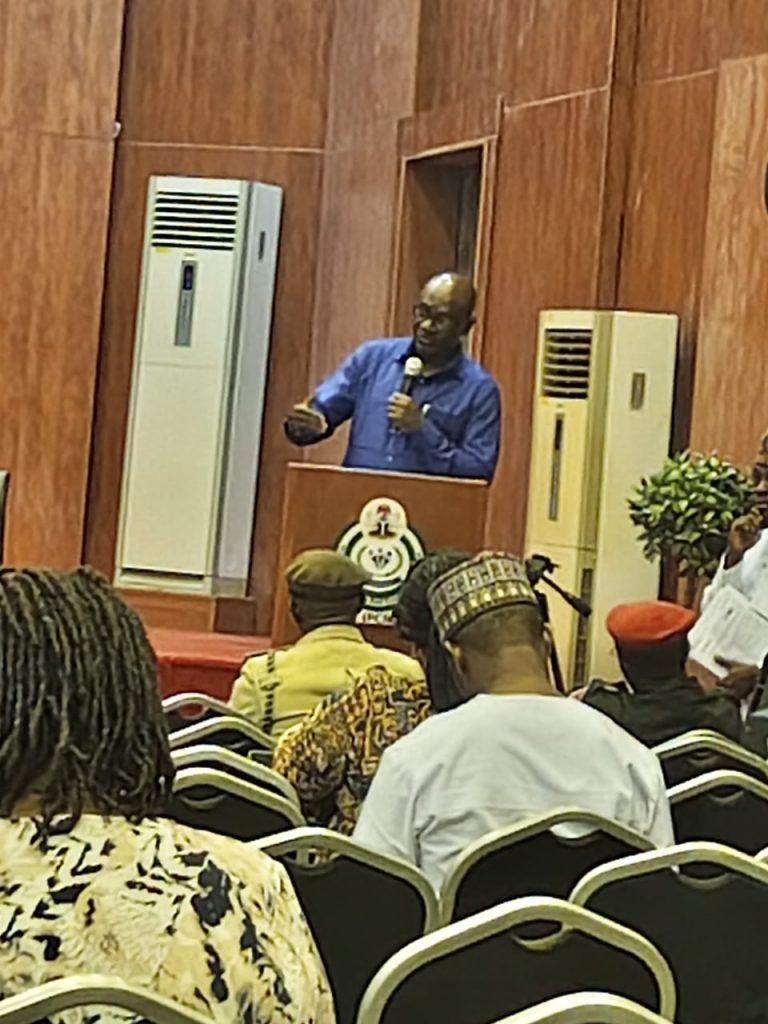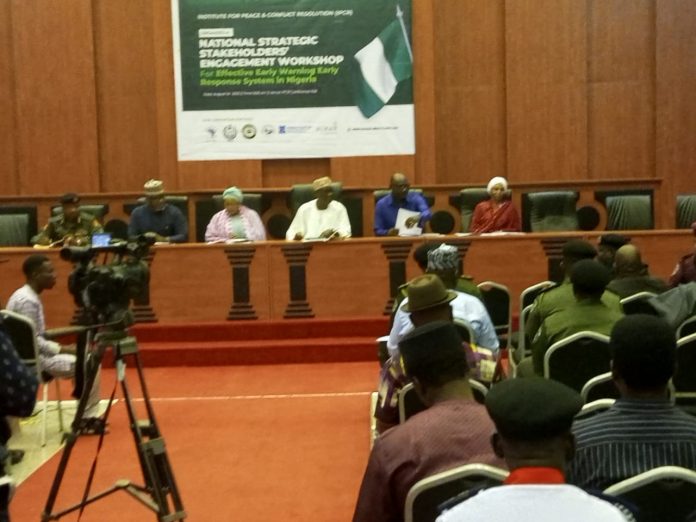The Director General of the Institute for Peace and Conflict Resolution (IPCR), Dr. Joseph Ochogwu, has identified late response to early warning as the major factor for recurring violent conflict in the country.
Speaking at the national strategic stakeholders engagement workshop for effective conflict early warning and early response system in Nigeria held in Abuja at the Institute, Dr. Ochogwu noted that the special gathering of stakeholders, holds the promise for a better conflict prevention stratagem and a peaceful nation.
He said: “Early responses to these signals often come too little, too late. This may be one of the reasons why Nigeria is bedeviled with recurring violent conflicts. Early Warning Early Response (EWER) has been a veritable tool for conflict management which the IPCR in collaboration with all of you present at this gathering seeks to build, to ensure an effective EWER system that will become the hallmark of conflict prevention in Nigeria.”
The DG said that IPCR is in the process of building a robust Conflict Early Warning Early Response (CEWER) system for Nigeria in collaboration with a consortium of government and non-governmental organizations under a project called ‘Peace Action for Rapid Transformative Nigerian Early Response’(PARTNER).
“The PARTNER project is a collaborative effort sponsored by the USAID to promote early warning and early response, peace-building and social cohesion in Nigeria. As far as we know, Nigeria is faced with numerous security challenges that are thwarting the desired unity and cohesion, stability, peaceful coexistence and inclusive development necessary for the pursuit of happiness of every citizen.

“Violent conflict is threatening the fabric of our existence and challenging our humanity in so many ways. It has become imperative to invoke every patriotic attempt to insist on conflict prevention and a non-violent approach to conflicts.
“Conflict prevention is a service that a single agency may not be able to achieve on its own. It will take a whole of society and whole of government approach to prevent violent conflict in a sustainable way.
“The collaboration between IPCR and PARTNER intends to deliver an effective conflict EWER system that will accommodate a robust partnership across the security and non-security stakeholders towards a comprehensive outcome,” he said.
The DG said that the establishment of the national Early Warning Response Group (EWRG), will open a new vista in conflict prevention and mitigation through early response, adding that the establishment will be replicated in sub national locations across the country.
“The objective of IPCR today is to ensure that we close the gap between early warning and early response. The prevalence and reality of violent conflict in Nigeria and Africa is evident in part, because there is inadequate communication and disconnection between members of the community and security agencies meant to respond to early warnings. It is apparent that there is the need to find an effective way of communicating early warning to attract the fastest response, in order to prevent conflict from escalating into violence,” he said.
Explaining what IPCR stands for, the Director General of the Institute, Dr. Ochogwu said, “the Institute for Peace and Conflict Resolution (IPCR) Abuja is a federal government agency saddled with the mandate of conflict prevention, mitigation, resolution and management. It is an agency established to promote non-violent interactions among communities, people and territories in Nigeria and Africa to engender conflict resilience and sustainable peace.”
In his opening remarks, the Permanent Secretary, Ministry of Foreign Affairs, Amb. Adamu Ibrahim Lamuwa, expressed joy that the occasion is happening at a time the nation’s efforts towards sustainable development is persistently frustrated by violence. “It is also a heart warming thing to be here because this event have semblance of the type of strides that agencies in the sector need to make for us to have hope for sustainable peace in the future.
“I am aware that the Institute started the process of re-organizing the National Conflict Early Warning Early Response System to make it more effective since 2021, and today we are witnessing another big step being taken in that direction. From operational experience, IPCR recognized that it cannot run that project alone, hence the need to collaborate with consortium organisations including Mèrcy Corps, West Africa Network for Peacebuilding and others who have contributed immensely to make this event possible.
“The highlight of this occasion is the Establishment of a Standing National Conflict Early Warning Response Group (EWRG). This is a mile stone that have capacity to change the entire conflict prevention and Peacebuilding landscape in Nigeria.
He urged all the stakeholders to give IPCR and the PARTNER the required cooperation and support to make this project a success, the Permanent Secretary, who was represented at the occasion by the Director, National Peace Academy, Dr. Bose Awodola, commended the bold step taken by the Institute and her Consortium partners towards achieving sustainable peace in the country through the implementation of Early Warning, Social Cohesion and Peacebuilding.
The occasion was organised by IPCR in conjunction with Mercy Corps Nigeria and West African Network for Peace-building (WANEP).
The objective of the workshop is to sensitise the echelon of security agencies and to enhance the capacity of the personnel and other critical agents for effective and seamless response to early warning signals of conflict.Participants in the workshop include top echelon of security agencies and nominated personnel who will form a Proposed National Conflict Early Warning Response Group (EWRG).
The PARTNER consortium members, other than the Institute for Peace and Conflict Resolution, Mercy Corps Nigeria and West African Network for Peacebuilding, includes the Plateau Peacebuilding Agency, Kaduna State Peace Commission, Kukah Centre, Katsina State Peace Committee, Kano State Peace Committee and Mambayya House. It is sponsored by the United States Agency for International Development, USAID.

Call:
Sandra - 07069148333
Pauline - 08174374150
Scholastica - 09060678434













